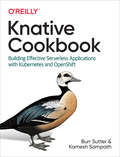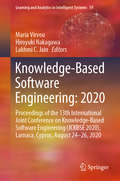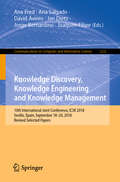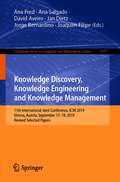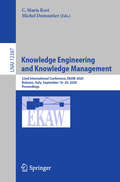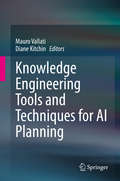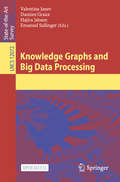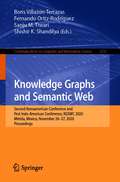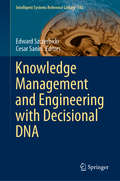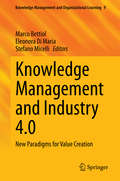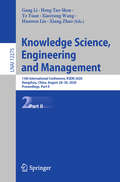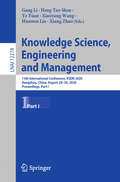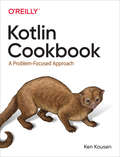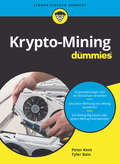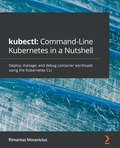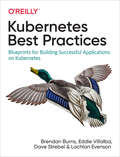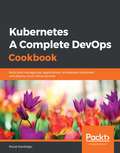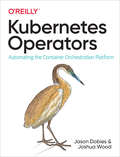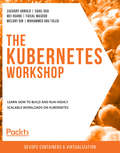- Table View
- List View
Klopp Actually: (Imaginary) Life with Football's Most Sensible Heartthrob
by Laura LexxA hilarious diary of married life with the sensible, no-nonsense man of all our dreams: Jürgen Klopp, from critically-acclaimed comedian and Twitter sensation Laura Lexx.Inspired by the viral tweet: 'If I ever met Jürgen Klopp I'd say "omg if we have a baby we should call it Klipp" just so he'd raise an eyebrow at me and tell me I'm a moron and I'd be so naked by the time he'd finished doing that...'In these uncertain times we all need a coping mechanism. And Laura Lexx has found the obvious one - imagining life married to the sensible, no-nonsense man of our dreams, Jürgen Klopp. She thinks maybe he has something to do with football? More importantly, he definitely knows how to efficiently stack a dishwasher and would tell you honestly if you were being unreasonable about a colleague. From job interviews to furniture shopping in IKEA to making a birthday cake for their daughter, Klipp, Klopp Actually is a hilarious, warm and deeply silly diary of life with everyone's favourite baseball-cap-wearing, bespectacled German football manager. 'I shiver, my skin breaking out into tiny goosebumps. "Are you cold?" He whispers, his lips brushing my ear, making the fine hairs ripple. "A little." I grin, pressing against his thigh. He runs a hand down the curve of my spine... "You should put a jumper on."''I'd LOVE to read a whole book of Laura's funny, clever, sweet imagination . . . it made me laugh a huge amount!' Marian Keyes'Laura is so funny and I can't wait to read this book and I hope it isn't awkward when I *actually* marry Jürgen Klopp' Sara Pascoe'It's rare to find brilliant new talent, rarer still to discover it on twitter but Laura's thread on Klopp was my highlight of the year. I cannot wait to see what she does in book form. I shall devour it. A great shining comedic talent' Emma Kennedy(P)2020 Hodder & Stoughton Limited
Knative Cookbook: Building Effective Serverless Applications with Kubernetes and OpenShift
by Burr Sutter Kamesh SampathEnterprise developers face several challenges when it comes to building serverless applications, such as integrating applications and building container images from source. With more than 60 practical recipes, this cookbook helps you solve these issues with Knative—the first serverless platform natively designed for Kubernetes. Each recipe contains detailed examples and exercises, along with a discussion of how and why it works.If you have a good understanding of serverless computing and Kubernetes core resources such as deployment, services, routes, and replicas, the recipes in this cookbook show you how to apply Knative in real enterprise application development. Authors Kamesh Sampath and Burr Sutter include chapters on autoscaling, build and eventing, observability, Knative on OpenShift, and more.With this cookbook, you’ll learn how to:Efficiently build, deploy, and manage modern serverless workloadsApply Knative in real enterprise scenarios, including advanced eventingMonitor your Knative serverless applications effectivelyIntegrate Knative with CI/CD principles, such as using pipelines for faster, more successful production deploymentsDeploy a rich ecosystem of enterprise integration patterns and connectors in Apache Camel K as Kubernetes and Knative components
Knowledge-Based Software Engineering: Proceedings of the 13th International Joint Conference on Knowledge-Based Software Engineering (JCKBSE 2020), Larnaca, Cyprus, August 24-26, 2020 (Learning and Analytics in Intelligent Systems #19)
by Lakhmi C. Jain Maria Virvou Hiroyuki NakagawaThis book summarizes the research findings presented at the 13th International Joint Conference on Knowledge-Based Software Engineering (JCKBSE 2020), which took place on August 24–26, 2020. JCKBSE 2020 was originally planned to take place in Larnaca, Cyprus. Unfortunately, the COVID-19 pandemic forced it be rescheduled as an online conference. JCKBSE is a well-established, international, biennial conference that focuses on the applications of artificial intelligence in software engineering. The 2020 edition of the conference was organized by Hiroyuki Nakagawa, Graduate School of Information Science and Technology, Osaka University, Japan, and George A. Tsihrintzis and Maria Virvou, Department of Informatics, University of Piraeus, Greece. This research book is a valuable resource for experts and researchers in the field of (knowledge-based) software engineering, as well as general readers in the fields of artificial and computational Intelligence and, more generally, computer science wanting to learn more about the field of (knowledge-based) software engineering and its applications. An extensive list of bibliographic references at the end of each paper helps readers to probe further into the application areas of interest to them.
Knowledge Discovery, Knowledge Engineering and Knowledge Management: 10th International Joint Conference, IC3K 2018, Seville, Spain, September 18-20, 2018, Revised Selected Papers (Communications in Computer and Information Science #1222)
by Ana Fred Ana Salgado David Aveiro Jan Dietz Jorge Bernardino Joaquim FilipeThis book constitutes the thoroughly refereed proceedings of the 10th International Joint Conference on Knowledge Discovery, Knowledge Engineering and Knowledge Management, IC3K 2018, held in Seville, Spain, in September 2018.The 12 full papers presented were carefully reviewed and selected from 167 submissions. The papers are organized in topical sections on knowledge discovery and information retrieval; knowledge engineering and ontology development; and knowledge management and information sharing.
Knowledge Discovery, Knowledge Engineering and Knowledge Management: 11th International Joint Conference, IC3K 2019, Vienna, Austria, September 17-19, 2019, Revised Selected Papers (Communications in Computer and Information Science #1297)
by Ana Fred Ana Salgado David Aveiro Jan Dietz Jorge Bernardino Joaquim FilipeThis book constitutes the revised selected papers of the 11th International Joint Conference on Knowledge Discovery, Knowledge Engineering and Knowledge Management, IC3K 2019, held in Vienna, Austria, in September 2019.The 25 full papers presented were carefully reviewed and selected from 220 submissions. The papers are organized in topical sections on knowledge discovery and information retrieval; knowledge engineering and ontology development; and knowledge management and information systems.
Knowledge Engineering and Knowledge Management: 22nd International Conference, EKAW 2020, Bolzano, Italy, September 16–20, 2020, Proceedings (Lecture Notes in Computer Science #12387)
by C. Maria Keet Michel DumontierThis book constitutes the refereed proceedings of the 22nd International Conference on Knowledge Engineering and Knowledge Management, EKAW 2020, held in Bolzano, Italy, in September 2020. The 12 full papers presented together with 7 were carefully reviewed and selected from 104 submissions. The special theme of EKAW 2020 is „Ethical and Trustworthy Knowledge Engineering". The papers cover all aspects of eliciting, acquiring, discovering, modeling, and managing knowledge and construction of knowledge-intensive systems.
Knowledge Engineering Tools and Techniques for AI Planning
by Mauro Vallati Diane KitchinThis book presents a comprehensive review for Knowledge Engineering tools and techniques that can be used in Artificial Intelligence Planning and Scheduling. KE tools can be used to aid in the acquisition of knowledge and in the construction of domain models, which this book will illustrate. AI planning engines require a domain model which captures knowledge about how a particular domain works - e.g. the objects it contains and the available actions that can be used. However, encoding a planning domain model is not a straightforward task - a domain expert may be needed for their insight into the domain but this information must then be encoded in a suitable representation language. The development of such domain models is both time-consuming and error-prone. Due to these challenges, researchers have developed a number of automated tools and techniques to aid in the capture and representation of knowledge.This book targets researchers and professionals working in knowledge engineering, artificial intelligence and software engineering. Advanced-level students studying AI will also be interested in this book.
Knowledge Graphs and Big Data Processing (Lecture Notes in Computer Science #12072)
by Valentina Janev Damien Graux Hajira Jabeen Emanuel SallingerThis open access book is part of the LAMBDA Project (Learning, Applying, Multiplying Big Data Analytics), funded by the European Union, GA No. 809965. Data Analytics involves applying algorithmic processes to derive insights. Nowadays it is used in many industries to allow organizations and companies to make better decisions as well as to verify or disprove existing theories or models. The term data analytics is often used interchangeably with intelligence, statistics, reasoning, data mining, knowledge discovery, and others. The goal of this book is to introduce some of the definitions, methods, tools, frameworks, and solutions for big data processing, starting from the process of information extraction and knowledge representation, via knowledge processing and analytics to visualization, sense-making, and practical applications. Each chapter in this book addresses some pertinent aspect of the data processing chain, with a specific focus on understanding Enterprise Knowledge Graphs, Semantic Big Data Architectures, and Smart Data Analytics solutions. This book is addressed to graduate students from technical disciplines, to professional audiences following continuous education short courses, and to researchers from diverse areas following self-study courses. Basic skills in computer science, mathematics, and statistics are required.
Knowledge Graphs and Semantic Web: Second Iberoamerican Conference and First Indo-American Conference, KGSWC 2020, Mérida, Mexico, November 26–27, 2020, Proceedings (Communications in Computer and Information Science #1232)
by Boris Villazón-Terrazas Shishir K. Shandilya Fernando Ortiz-Rodríguez Sanju M. TiwariThis book constitutes the thoroughly refereed proceedings of the Second Iberoamerican Conference, KGSWC 2020, held in Mérida, Mexico, in November 2020. Due to the COVID-19 pandemic the conference was held online. The 15 papers presented were carefully reviewed and selected from 45 submissions. The papers cover research and practices in several fields of AI, such as knowledge representation and reasoning, natural language processing/text mining, machine/deep learning, semantic web, and knowledge graphs.
Knowledge Management and Engineering with Decisional DNA (Intelligent Systems Reference Library #183)
by Edward Szczerbicki Cesar SaninThis is the first book on experience-based knowledge representation and knowledge management using the unique Decisional DNA (DDNA) technology. The DDNA concept is roughly a decade old, and is rapidly attracting increasing attention and interest among researchers and practitioners. This comprehensive book provides guidelines to help readers develop experience-based tools and approaches for smart engineering of knowledge, data and information. It does not attempt to offer ultimate answers, but instead presents ideas and a number of real-world case studies to explore and exemplify the complexities and challenges of modern knowledge engineering issues. It also increases readers’ awareness of the multifaceted interdisciplinary character of such issues to enable them to consider – in different ways – developing, evaluating, and supporting smart knowledge engineering systems that use DDNA technology based on experience.
Knowledge Management and Industry 4.0: New Paradigms for Value Creation (Knowledge Management and Organizational Learning #9)
by Eleonora Di Maria Marco Bettiol Stefano MicelliThe book discusses the opportunities and challenges of managing knowledge in the new reality of Industry 4.0. Addressing paradigmatic changes in value creation due to the development of digital technologies applied to manufacturing (additive manufacturing, IoT, robotics, etc.), it includes theoretical and empirical contributions on how Industry 4.0 technologies allow firms to create and exploit knowledge. The carefully selected expert contributions highlight the potential of these technologies in acquiring knowledge from a larger number of sources and examine approaches to innovation, organization of activities, and stakeholder development in the context of this next industrial revolution.
Knowledge Science, Engineering and Management: 13th International Conference, KSEM 2020, Hangzhou, China, August 28–30, 2020, Proceedings, Part II (Lecture Notes in Computer Science #12275)
by Gang Li Heng Tao Shen Ye Yuan Xiaoyang Wang Huawen Liu Xiang ZhaoThis two-volume set of LNAI 12274 and LNAI 12275 constitutes the refereed proceedings of the 13th International Conference on Knowledge Science, Engineering and Management, KSEM 2020, held in Hangzhou, China, in August 2020.*The 58 revised full papers and 27 short papers were carefully reviewed and selected from 291 submissions. The papers of the first volume are organized in the following topical sections: knowledge graph; knowledge representation; knowledge management for education; knowledge-based systems; and data processing and mining. The papers of the second volume are organized in the following topical sections: machine learning; recommendation algorithms and systems; social knowledge analysis and management; text mining and document analysis; and deep learning. *The conference was held virtually due to the COVID-19 pandemic.
Knowledge Science, Engineering and Management: 13th International Conference, KSEM 2020, Hangzhou, China, August 28–30, 2020, Proceedings, Part I (Lecture Notes in Computer Science #12274)
by Gang Li Heng Tao Shen Ye Yuan Xiaoyang Wang Huawen Liu Xiang ZhaoThis two-volume set of LNAI 12274 and LNAI 12275 constitutes the refereed proceedings of the 13th International Conference on Knowledge Science, Engineering and Management, KSEM 2020, held in Hangzhou, China, in August 2020.*The 58 revised full papers and 27 short papers were carefully reviewed and selected from 291 submissions. The papers of the first volume are organized in the following topical sections: knowledge graph; knowledge representation; knowledge management for education; knowledge-based systems; and data processing and mining. The papers of the second volume are organized in the following topical sections: machine learning; recommendation algorithms and systems; social knowledge analysis and management; text mining and document analysis; and deep learning. *The conference was held virtually due to the COVID-19 pandemic.
Kommentierte Gesetzessammlung Sachkunde nach § 34a und Geprüfte Schutz- und Sicherheitskraft: Alle einschlägigen Gesetze und Vorschriften inklusive der DGUV Vorschriften 1 und 23
by Robert SchwarzAlle relevanten Gesetze und Vorschriften der Sicherheitswirtschaft auf einen Blick - die ideale Hilfe bei der Prüfungsvorbereitung und ein schnelles Nachschlagewerk für die Praxis. Der Umgang mit den Gesetzestexten wird durch Kommentare und Hinweise zu den wichtigsten Paragrafen erleichtert, Lernende gewinnen ein besseres Verständnis für die Anwendung der Normen. Die Zusammenstellung ergänzt die beiden Lehrbücher "Sachkundeprüfung im Bewachungsgewerbe IHK" und "Geprüfte Schutz- und Sicherheitskraft IHK" sowie das dazugehörige Übungsbuch. Die aktualisierte 3. Auflage wurde dem Rechtsstand Frühjahr 2020 angepasst, insbesondere in den Bereichen Gewerbeordnung (GewO) und Waffengesetz (WaffG).
Konstruktion für die Additive Fertigung 2018
by Roland Lachmayer Rene Bastian Lippert Stefan KaierleDas Buch beschreibt grundlegende Spezifikationen von Bauteilen und Prozessen, Methoden zur Abschätzung der Bauteileignung und Anwendung der Additiven Fertigung sowie zur Entwicklung von Konzepten und Entwürfen. Weiter werden die Konstruktion von Bauteilen, deren Gestaltung zur Sicherstellung funktionaler Anforderungen und der Herstellbarkeit sowie Methoden und Werkzeuge zur Bauteiloptimierung dargestellt. Es erfolgt die Beschreibung von Ansätzen zur rechnergestützten Simulation sowie physischen Validierung von Bauteilen und die Erprobung von Bauteilen und Materialien. Daraus abgeleitet werden Maßnahmen zur Sicherstellung von Qualitätsaspekten charakterisiert. Weiterhin werden die Integration von Additiven Fertigungsverfahren in bestehende Prozesse dargestellt sowie Maßnahmen zur Steigerung der Wertschöpfung abgeleitet. Die Inhalte werden vor dem Hintergrund zum Aufbau neuer Geschäftsmodelle diskutiert, sie wurden 2018 auf einem Workshop präsentiert und zwischen Experten aus Forschung und Industrie erörtert.
Konstruktion für die Additive Fertigung 2019
by Roland Lachmayer Katharina Rettschlag Stefan KaierleDieses Buch thematisiert grundlegende Spezifikationen von Bauteilen und Prozessen, Methoden zur Abschätzung der Bauteileignung und Anwendung der Additiven Fertigung sowie zur Entwicklung von Konzepten und Entwürfen. Der Inhalt ist in vier Schwerpunktkapitel unterteilt: Zuerst wird auf die Integration additiver Fertigungsverfahren in bestehende Prozesse und Maßnahmen zur Steigerung der Wertschöpfung eingegangen. Nachfolgend sind Konstruktionen von Bauteilen, deren Gestaltung zur Sicherstellung funktionaler Anforderungen und Herstellbarkeit sowie Methoden zur Bauteiloptimierung dargestellt. Weiterhin werden Ansätze zur rechnergestützten Simulation sowie physischen Validierung von Bauteilen und deren Erprobung beschrieben. Daraus abgeleitet werden Maßnahmen zur Sicherstellung von Qualitätsaspekten charakterisiert. Die kapitelübergreifenden Inhalte werden vor dem Hintergrund zum Aufbau neuer Geschäftsmodelle diskutiert und legen den aktuellen Stand der Forschung im Bereich der Additiven Fertigung dar. Dieser Konferenzband baut auf den Inhalten des Vorjahresbandes "Konstruktion für die Additive Fertigung 2018" auf.
Kotlin Cookbook: A Problem-Focused Approach
by Ken KousenUse Kotlin to build Android apps, web applications, and more—while you learn the nuances of this popular language. With this unique cookbook, developers will learn how to apply thisJava-based language to their own projects. Both experienced programmers and those new to Kotlin will benefit from the practical recipes in this book.Author Ken Kousen (Modern Java Recipes) shows you how to solve problems with Kotlin by concentrating on your own use cases rather than on basic syntax. You provide the contextand this book supplies the answers. Already big in Android development, Kotlin can be used anywhere Java is applied, as well as for iOS development, native applications, JavaScriptgeneration, and more. Jump in and build meaningful projects with Kotlin today.Apply functional programming concepts, including lambdas, sequences, and concurrencySee how to use delegates, late initialization, and scope functionsExplore Java interoperability and access Java libraries using KotlinAdd your own extension functionsUse helpful libraries such as JUnit 5Get practical advice for working with specific frameworks, like Android and Spring
Krypto-Mining für Dummies (Für Dummies)
by Matt Millen Peter KentKryptowährungen versprechen schnelles Geld und Reichtum. Anders als die Goldsucher im vorletzten Jahrhundert brauchen Sie als Anleger oder Investor aber sehr viel mehr technisches Know-how, um in das Krypto-Mining-Spiel einzusteigen. Dieses Buch wurde von zwei Insidern geschrieben. Sie erläutern, welche Hard- und Software Sie brauchen und wie Sie bei der Gewinnung von Bitcoin, Ethereum, Monero, LiteCoin und Dash am besten vorgehen - und zwar so, dass Sie der Konkurrenz voraus sind und Ihren Return on Investment maximieren.
kubectl: Deploy, manage, and debug container workloads using the Kubernetes CLI
by Rimantas MoceviciusManage Kubernetes applications using kubectl and discover the different Kubernetes clustersKey FeaturesExplore the Kubernetes command line for deploying applications, inspecting clusters, and viewing logsLeverage kubectl for Kubernetes application management and container debuggingApply your knowledge of Docker to learn kubectl equivalent commands for Docker subcommandsBook DescriptionThe kubectl command line tool lets you control Kubernetes clusters to manage nodes in the cluster and perform all types of Kubernetes operations. This introductory guide will get you up to speed with kubectl in no time.The book is divided into four parts, touching base on the installation and providing a general overview of kubectl in the first part. The second part introduces you to managing Kubernetes clusters and working with nodes. In the third part, you'll be taken through the different ways in which you can manage Kubernetes applications, covering how to create, update, delete, view, and debug applications. The last part of the book focuses on various Kubernetes plugins and commands. You'll get to grips with using Kustomize and discover Helm, a Kubernetes package manager. In addition to this, you'll explore how you can use equivalent Docker commands in kubectl.By the end of this book, you'll have learned how to install and update an application on Kubernetes, view its logs, and inspect clusters effectively.What you will learnGet to grips with the basic kubectl commandsDelve into different cluster nodes and their resource usagesUnderstand the most essential features of kubectlDiscover how to patch Kubernetes deployments with KustomizeFind out ways to develop and extend kubectl tools with their own pluginsExplore how to use Helm as an advanced tool for deploying appsWho this book is forThis book is for developers, system administrators, and anyone who wants to use the kubectl command-line tool to perform Kubernetes functionalities. A basic understanding of Kubernetes and Docker is required to get started with this book.
Kubernetes and Docker - An Enterprise Guide: Effectively containerize applications, integrate enterprise systems, and scale applications in your enterprise
by Scott Surovich Marc BoorshteinApply Kubernetes beyond the basics of Kubernetes clusters by implementing IAM using OIDC and Active Directory, Layer 4 load balancing using MetalLB, advanced service integration, security, auditing, and CI/CDKey FeaturesFind out how to add enterprise features to a Kubernetes cluster with theory and exercises to guide youUnderstand advanced topics including load balancing, externalDNS, IDP integration, security, auditing, backup, and CI/CDCreate development clusters for unique testing requirements, including running multiple clusters on a single server to simulate an enterprise environmentBook DescriptionContainerization has changed the DevOps game completely, with Docker and Kubernetes playing important roles in altering the flow of app creation and deployment. This book will help you acquire the knowledge and tools required to integrate Kubernetes clusters in an enterprise environment.The book begins by introducing you to Docker and Kubernetes fundamentals, including a review of basic Kubernetes objects. You'll then get to grips with containerization and understand its core functionalities, including how to create ephemeral multinode clusters using kind. As you make progress, you'll learn about cluster architecture, Kubernetes cluster deployment, and cluster management, and get started with application deployment. Moving on, you'll find out how to integrate your container to a cloud platform and integrate tools including MetalLB, externalDNS, OpenID connect (OIDC), pod security policies (PSPs), Open Policy Agent (OPA), Falco, and Velero. Finally, you will discover how to deploy an entire platform to the cloud using continuous integration and continuous delivery (CI/CD).By the end of this Kubernetes book, you will have learned how to create development clusters for testing applications and Kubernetes components, and be able to secure and audit a cluster by implementing various open-source solutions including OpenUnison, OPA, Falco, Kibana, and Velero.What you will learnCreate a multinode Kubernetes cluster using kindImplement Ingress, MetalLB, and ExternalDNSConfigure a cluster OIDC using impersonationMap enterprise authorization to KubernetesSecure clusters using PSPs and OPAEnhance auditing using Falco and EFKBack up your workload for disaster recovery and cluster migrationDeploy to a platform using Tekton, GitLab, and ArgoCDWho this book is forThis book is for anyone interested in DevOps, containerization, and going beyond basic Kubernetes cluster deployments. DevOps engineers, developers, and system administrators looking to enhance their IT career paths will also find this book helpful. Although some prior experience with Docker and Kubernetes is recommended, this book includes a Kubernetes bootcamp that provides a description of Kubernetes objects to help you if you are new to the topic or need a refresher.
Kubernetes Best Practices: Blueprints for Building Successful Applications on Kubernetes
by Brendan Burns Eddie Villalba Dave Strebel Lachlan EvensonIn this practical guide, four Kubernetes professionals with deep experience in distributed systems, enterprise application development, and open source will guide you through the process of building applications with this container orchestration system. Based on the experiences of companies that are running Kubernetes in production successfully, many of the methods are also backed by concrete code examples.This book is ideal for those already familiar with basic Kubernetes concepts who want to learn common best practices. You’ll learn exactly what you need to know to build your best app with Kubernetes the first time.Set up and develop applications in KubernetesLearn patterns for monitoring, securing your systems, and managing upgrades, rollouts, and rollbacksUnderstand Kubernetes networking policies and where service mesh fits inIntegrate services and legacy applications and develop higher-level platforms on top of KubernetesRun machine learning workloads in Kubernetes
Kubernetes - A Complete DevOps Cookbook: Build and manage your applications, orchestrate containers, and deploy cloud-native services
by Murat KarsliogluLeverage Kubernetes and container architecture to successfully run production-ready workloads Key Features Implement Kubernetes to orchestrate and scale applications proficiently Leverage the latest features of Kubernetes to resolve common as well as complex problems in a cloud-native environment Gain hands-on experience in securing, monitoring, and troubleshooting your application Book Description Kubernetes is a popular open source orchestration platform for managing containers in a cluster environment. With this Kubernetes cookbook, you'll learn how to implement Kubernetes using a recipe-based approach. The book will prepare you to create highly available Kubernetes clusters on multiple clouds such as Amazon Web Services (AWS), Google Cloud Platform (GCP), Azure, Alibaba, and on-premises data centers. Starting with recipes for installing and configuring Kubernetes instances, you'll discover how to work with Kubernetes clients, services, and key metadata. You'll then learn how to build continuous integration/continuous delivery (CI/CD) pipelines for your applications, and understand various methods to manage containers. As you advance, you'll delve into Kubernetes' integration with Docker and Jenkins, and even perform a batch process and configure data volumes. You'll get to grips with methods for scaling, security, monitoring, logging, and troubleshooting. Additionally, this book will take you through the latest updates in Kubernetes, including volume snapshots, creating high availability clusters with kops, running workload operators, new inclusions around kubectl and more. By the end of this book, you'll have developed the skills required to implement Kubernetes in production and manage containers proficiently. What you will learn Deploy cloud-native applications on Kubernetes Automate testing in the DevOps workflow Discover and troubleshoot common storage issues Dynamically scale containerized services to manage fluctuating traffic needs Understand how to monitor your containerized DevOps environment Build DevSecOps into CI/CD pipelines Who this book is for This Kubernetes book is for developers, IT professionals, and DevOps engineers and teams who want to use Kubernetes to manage, scale, and orchestrate applications in their organization. Basic understanding of Kubernetes and containerization is necessary.
Kubernetes Operators: Automating the Container Orchestration Platform
by Jason Dobies Joshua WoodOperators are a way of packaging, deploying, and managing Kubernetes applications. A Kubernetes application doesn’t just run on Kubernetes; it’s composed and managed in Kubernetes terms. Operators add application-specific operational knowledge to a Kubernetes cluster, making it easier to automate complex, stateful applications and to augment the platform. Operators can coordinate application upgrades seamlessly, react to failures automatically, and streamline repetitive maintenance like backups.Think of Operators as site reliability engineers in software. They work by extending the Kubernetes control plane and API, helping systems integrators, cluster administrators, and application developers reliably deploy and manage key services and components. Using real-world examples, authors Jason Dobies and Joshua Wood demonstrate how to use Operators today and how to create Operators for your applications with the Operator Framework and SDK. <li>Learn how to establish a Kubernetes cluster and deploy an Operator <li>Examine a range of Operators from usage to implementation <li>Explore the three pillars of the Operator Framework: the Operator SDK, the Operator Lifecycle Manager, and Operator Metering <li>Build Operators from the ground up using the Operator SDK <li>Build, package, and run an Operator in development, testing, and production phases <li>Learn how to distribute your Operator for installation on Kubernetes clusters
The Kubernetes Workshop: Learn how to build and run highly scalable workloads on Kubernetes
by Wei Huang Melony Qin Zachary Arnold Sahil Dua Faisal Masood Mohammed Abu TalebFrom building your own cluster to running cloud-native applications with Kubernetes, this workshop covers it all using engaging examples and activities Key Features Explore the Kubernetes environment and understand how containers are managed Learn how to build, maintain, and deploy cloud-native applications using Kubernetes Get to grips with using Kubernetes primitives to manage the life cycle of a full application stack Book Description Thanks to its extensive support for managing hundreds of containers that run cloud-native applications, Kubernetes is the most popular open source container orchestration platform that makes cluster management easy. This workshop adopts a practical approach to get you acquainted with the Kubernetes environment and its applications. Starting with an introduction to the fundamentals of Kubernetes, you'll install and set up your Kubernetes environment. You'll understand how to write YAML files and deploy your first simple web application container using Pod. You'll then assign human-friendly names to Pods, explore various Kubernetes entities and functions, and discover when to use them. As you work through the chapters, this Kubernetes book will show you how you can make full-scale use of Kubernetes by applying a variety of techniques for designing components and deploying clusters. You'll also get to grips with security policies for limiting access to certain functions inside the cluster. Toward the end of the book, you'll get a rundown of Kubernetes advanced features for building your own controller and upgrading to a Kubernetes cluster without downtime. By the end of this workshop, you'll be able to manage containers and run cloud-based applications efficiently using Kubernetes. What you will learn Get to grips with the fundamentals of Kubernetes and its terminology Share or store data in different containers running in the same pod Create a container image from an image definition manifest Construct a Kubernetes-aware continuous integration (CI) pipeline for deployments Attract traffic to your app using Kubernetes ingress Build and deploy your own admission controller Who this book is for Whether you are new to the world of web programming or are an experienced developer or software engineer looking to use Kubernetes for managing and scaling containerized applications, you'll find this workshop useful. A basic understanding of Docker and containerization is necessary to make the most of this book.
Künstliche Intelligenz: Was steckt hinter der Technologie der Zukunft?
by Gerhard Paaß Dirk HeckerKünstliche Intelligenz (KI) ist heute schon in unserem Alltag präsent und wird uns zukünftig in nahezu allen Lebensbereichen begegnen – von der bildgestützten Diagnose in der Medizin über das autonome Fahren und die intelligente Maschinenwartung in der Industrie bis hin zur Sprachsteuerung im smarten Zuhause. Die Potenziale der KI sind enorm, gleichzeitig kursieren viele Mythen, Ungewissheiten und Herausforderungen, die es zu meistern gilt. Dieses Buch adressiert daher die breite Öffentlichkeit – von interessierten Bürgerinnen und Bürgern bis hin zur Leitungsebene in Unternehmen, die ein besseres und tieferes technisches Verständnis von KI-Technologien aufbauen und deren Folgen abschätzen möchten.In verständlicher Sprache werden mathematische Grundlagen, Begriffe und Methoden erläutert. Eine abschließende Diskussion der Chancen und Herausforderungen hilft den Leserinnen und Lesern, die Entwicklungen zu bewerten, sie zu entmystifizieren und ihre Relevanz für die Zukunft zu erkennen.

